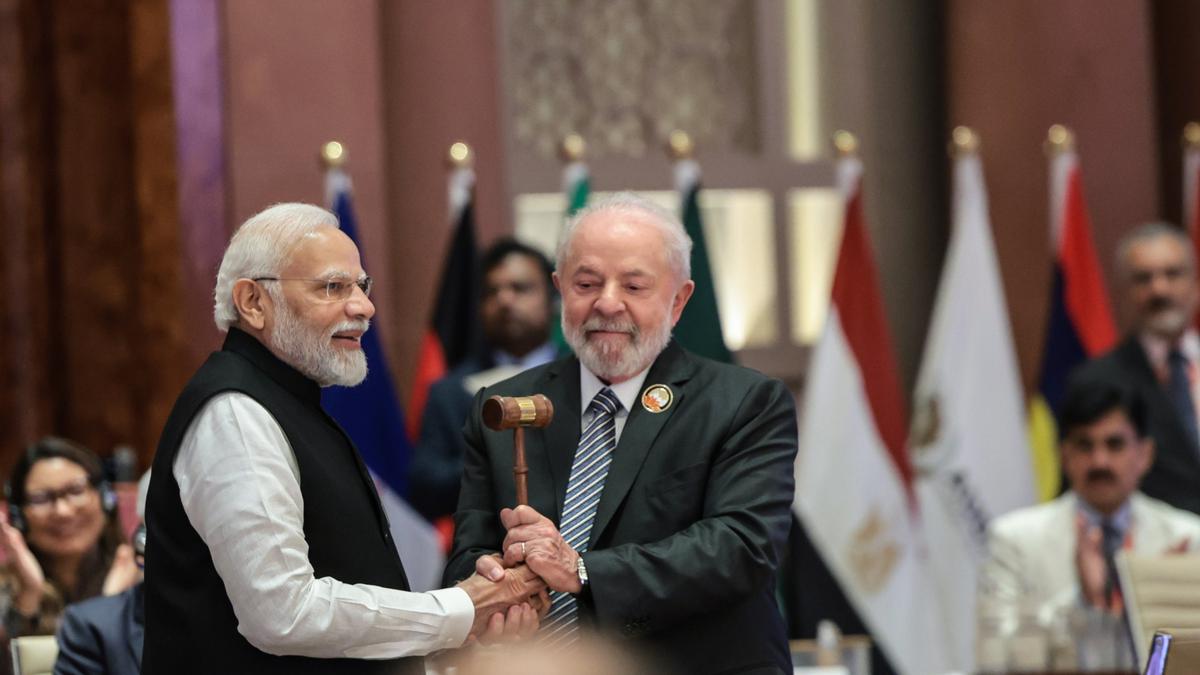
Brazil to give continuity to India’s presidency of G-20, says Ambassador, ahead of handover
The Hindu
“We see the Brazilian presidency as giving continuity to the Indian presidency, in ensuring that the interests and challenges of the Global South will be an important part of the G-20 agenda,” Brazillian ambassador to India Kenneth Felix Haczynski da Nobrega said.
As India prepares to end its G-20 presidency this month with two separate virtual summits to be chaired by Prime Minister Narendra Modi, Brazil hopes to give “continuity” to New Delhi’s priorities, its ambassador said. The Ministry of External Affairs (MEA) has sent out invitations for the two summits — the Second Voice of Global South Summit to be held on November 17, and the G-20 Virtual Summit to be held on November 22. The MEA is still awaiting confirmations from many of the leaders of the two sets of countries. Brazil’s President Luiz Inacio Lula da Silva, who will take over the G-20 presidency, has confirmed his attendance at both, and hopes to take forward the focus on the global south and developing world, said Brazilian Ambassador Kenneth Felix Haczynski da Nobrega.
“We see the Brazilian presidency as giving continuity to the Indian presidency, in ensuring that the interests and challenges of the Global South will be an important part of the G-20 agenda,” Mr. Haczynski da Nobrega, who presented his credentials shortly before the G-20 summit in Delhi, told The Hindu. While Mr. Modi did the formal handover of the G-20 “gavel” to Brazilian President Lula at the end of the summit on September 10, India’s G-20 presidency will only end this month.
“The Brazilian G-20 presidency will seek its own special emphasis on fighting hunger and poverty, bringing the idea of sustainable development centre stage to the climate change debate, and will continue to push for the reform of the multilateral system,” Mr. Haczynski da Nobrega added.
While Brazil may have a different emphasis on some issues, the Ambassador said, its goals and targets were similar to India’s as members of the developing world, and partners in groupings like BRICS (Brazil-Russia-India-China-South Africa), IBSA (India-Brazil-South Africa), and the G-4 grouping (Brazil, Germany, India, and Japan) that support each other for UN Security Council membership.
Brazil is presently the host of IBSA, will host G-20 in 2024, and the COP30 Climate Change Summit in 2025, and hopes to work closely with partners like India, South Africa and Indonesia, all developing countries that are part of the “extended troika” or group that is hosting successive summits of the G-20.
During the G-20 Summit in Delhi in September, India was able to forge a breakthrough joint statement from the group, deeply divided over the Ukraine war, after a joint proposal by India-Indonesia-Brazil-South Africa was offered to other members as an ultimatum a day before the Summit. The proposal, that dropped critical references to Russia, but retained language against the war in Ukraine was seen as a rare moment of global solidarity during the Indian presidency. Ahead of the Virtual G-20 summit on November 22, officials have made it clear that while the new issue of the Israel-Gaza conflict is likely to overshadow some of the proceedings, India does not plan any joint statement or major outcomes from the summit.
Instead, the Prime Minister’s Office which is overseeing planning for the two summits wants them to focus on implementation and delivery of the agreements and declarations made during the Voice of Global South Summit in January 2023 and G-20 Summit in September.

 Run 3 Space | Play Space Running Game
Run 3 Space | Play Space Running Game
 Traffic Jam 3D | Online Racing Game
Traffic Jam 3D | Online Racing Game
 Duck Hunt | Play Old Classic Game
Duck Hunt | Play Old Classic Game




